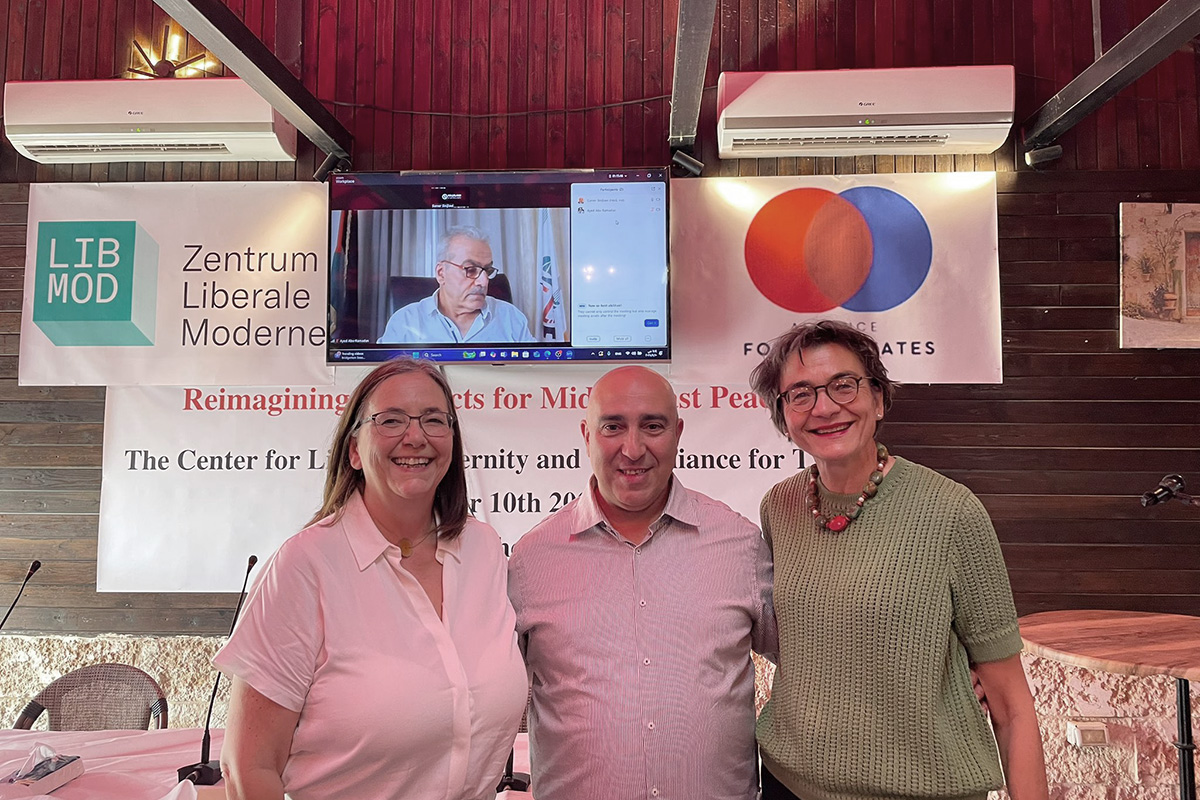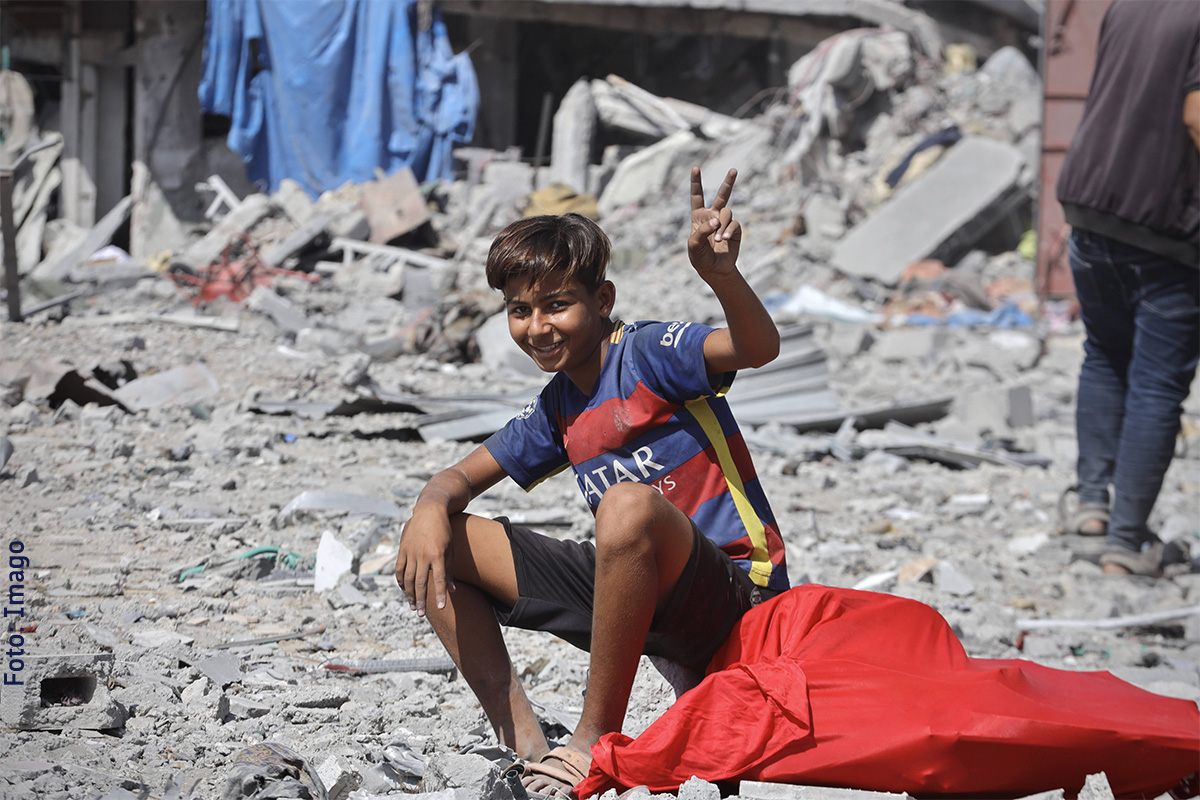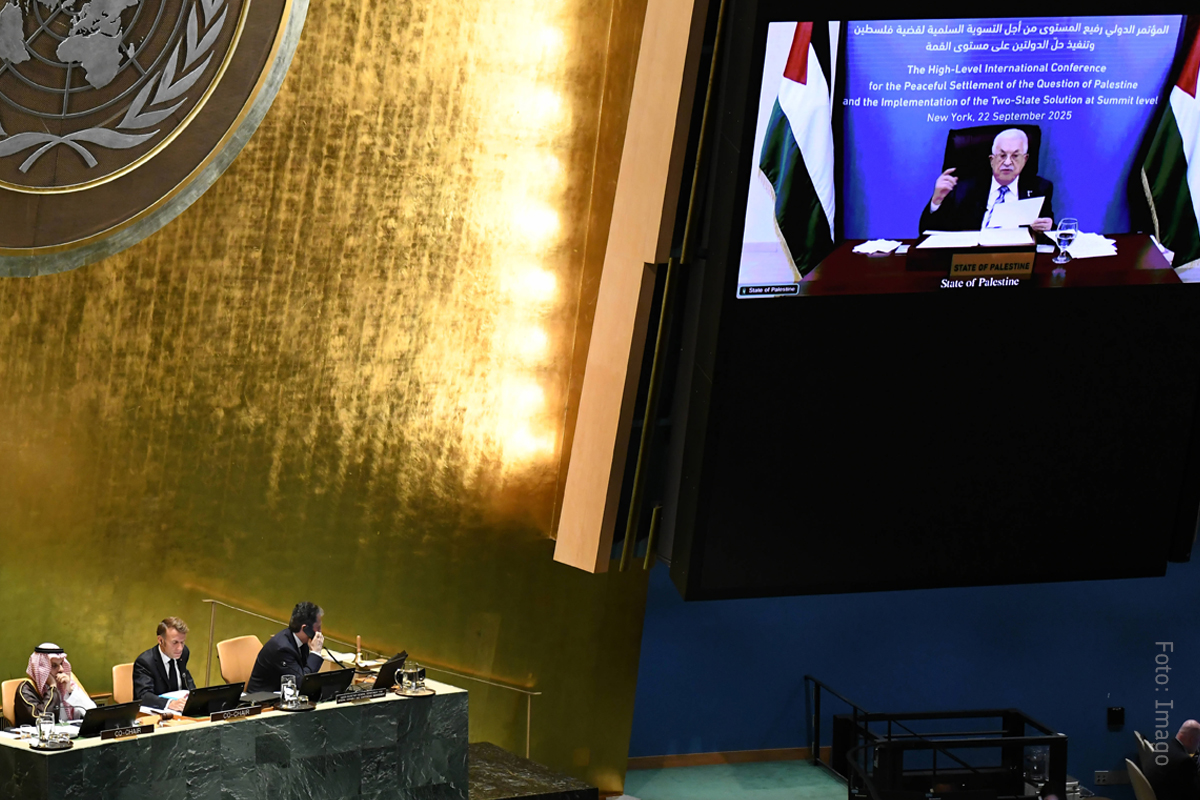“I don’t see a revolution coming soon in Iran”

Israel and Iran: Iranian-Israeli author Meir Javendafar in an interview with Till Schmidt about the mutual perception of the two countries, the current situation of protests and Russia’s influence on the nuclear agreement.
Mr. Javendafar, you left Iran in 1987, have moved to Israel after your studies in the UK and now work as a researcher on Iran-Israel relations. Almost a year ago, the violent death of Jina Mahsa Amini sparked a powerful protest movement against the regime in Iran. How did the Israeli public respond?
With a lot of attention. Because really everyone in Israel — left or right, pro- or anti-Netanyahu, and even parts of Israeli Arab community — wants the end of the Iranian regime, given that the Islamic Republic has been calling for the destruction of Israel and funding the murder of Israelis for many years. Every uprising in Iran is reported in detail in the local media and, in my opinion, usually quite broadly and accurately.
So the hope for a revolution in Iran is there. But I myself do not see it coming so soon. We know from Syria, for example, that such regimes prefer to murder their own people in great numbers, rather than hand over power. And even if the regime falls, it is possible that in the long run, Iran will not turn into a democracy, but rather into a secular dictatorship. But even that would be better for Israel, because Iran would stop supporting terrorists while establishing relations with Israel.
What are the attitudes of the Israeli population toward Iran?
The regime is seen as an existential threat by some and the biggest strategic threat by others. At the same time, many Israelis feel friendship and solidarity with the Iranian people. Iranians and Persians are almost glorified, especially in comparison to the Arabs. This is because of the ancient civilization of the Persians, the story of the Persian king Cyrus, who saved the Jews from the Babylonian exile, and the positive experiences that many Israelis had in Iran before the 1979 revolution. Last but not least, contemporary Iranian cinema has been very successful and well received in Israel.
Conversely, what can you say about the perception of Israel among the Iranian population?
From my understanding and observations, Israel’s popularity among ordinary Iranians has increased significantly over the past decade. On the eve of the 1979 revolution, it was quite different, which can be explained mainly by the strength of the anti-imperialist movement and the much more pronounced religiosity in the Iranian population at that time. Today’s view of Israel is primarily due to hatred of the Iranian regime. Benjamin Netanyahu, and Donald Trump, are more popular in Iran than some would like to believe.
This sounds like a classic identification with the enemy of the enemy as a friend. Do people also refer to specific aspects of Israeli history, culture or politics?
There is some appreciation of Israeli technology. But from my observations and understanding, what the Iranian people like most about Israel, are the military attacks on Iranian targets in Syria. Especially when it hits the Revolutionary Guards, since they are so heavily involved in repressing the population in Iran.
The nuclear conflict remains unresolved. Under Donald Trump, the United States had withdrawn from the nuclear agreement, the Joint Comprehensive Plan of Action (JCPOA), in 2018. Joe Biden intended to revive the agreement, which had beennegotiated in 2015. Where does Israel stand in the current situation?
Israel is looking at what the United States is doing. There is not much more Israel can do at the moment. Biden wanted to correct Trump’s mistake after he took office. But in the meantime, Iran itself had taken big steps away from the JCPOA. Biden had been counting on a gradual return to a deal — and expected Iran to play along. But that would have included, for example, Iran answering the International Atomic Energy Agency’s questions about the nuclear facilities where traces of uranium enrichment were found. Iran is now enriching uranium to a level, which is close to the 90 percent needed to build a bomb.
For further contextualization, could you outline Israel’s geopolitical position with regard to the threat from the Iranian regime?
The most important conventional threat is the Iranian-provided Hezbollah missile arsenal in Lebanon, which can reach to any part of Israel. This is a threat that no prime minister of Israel can ignore. Add to that the bombardments in Syria that Israel has been conducting for many years to ensure that the country does not become another missile base for Iran like Lebanon.
What has Israel recently done to counter the nuclear threat from Iran?
At the moment, it is working together with the U.S. and Europe. In addition, it is monitoring Iranian activities and passing on relevant information. But as soon as Israel learns that Supreme Leader Ayatollah Khamenei has given the order to build a nuclear weapon, in my opinion, Israel would independently and immediately bomb Iran’s nuclear facilities.
For a long time, it looked as if Israel would ally itself more with Saudia Arabia because of the threat from Iran. Now the Saudis and Iran have moved much closer together in the spring. What is your assessment of this?
The Saudis do not want to give Iran a reason to attack them in the event of a war between Israel and Iran. Iran agreed to the deal merely because of pressure from China. Xi Jinping pressured Iran to reach the agreement with the Saudis, because their ongoing conflict was undermining the oil market and stability in the Middle East, both of which are important to Chinese economic interests.
Moreover, the Saudis are not investing in Iran, which is under sanctions, nor is there any political support from them. In other words, the deal is not a game changer. The Saudis are still extremely concerned about a nuclear Iran. They just don’t say it that openly anymore. Furthermore, it is very likely that Saudi intelligence cooperation with Israel will continue.
What other geopolitical changes are currently contributing to the establishment of a multipolar world order in the Middle East?
In the region, people are realizing that the U.S. has more important priorities: namely China, Russia, and domestic issues. Consequently, some countries are improving their diplomatic relations with Israel. Others are turning to China. China’s economic involvement in the region is unprecedented. However, the U.S. remains the preferred source of technology, the most important partner for economic cooperation, and also the most popular destination for students from the region. Concerned that the U.S. is turning away, many countries are balancing their relations with China by moving closer to it.
How is Putin’s regime influencing the development of the nuclear dispute?
Russia’s veto is one reason why Iran’s diplomatic relations with the U.S. have not improved and the nuclear agreement has not been revived. Iran has been Russia’s most important arms supplier since the war of aggression against Ukraine. Iran has chosen Russia – thus moving away from returning to the JCPOA – for three reasons.
First, there is its difficult position in the nuclear dispute. Khamenei seems reluctant to answer the IAEA’s questions about uranium enrichment at certain facilities because Iran could be found to have violated its responsibilities to the IAEA. Second, if the nuclear agreement is revived, Khamenei fears a U.S. charm offensive. He is worried that U.S soft power in the longer term, may cause the downfall of his regime. Last, Putin is seen as someone who defends his allies who face the prospect of regime change: see Assad in 2015 in Syria, Lukashenko in 2020 in Belarus, and Tokayev in 2022 in Kazakhstan.
How is Israel’s strategic position perceived in light of the dispute over judicial reform?
As weak. In politics, perception is more important that reality. Thus, the rift in Israeli society that Netanyahu and his government are deepening ultimately plays into the hands of the Iranian regime, Hezbollah, and other enemies of Israel. For a long time, the threat of war with Hezbollah has not been as high as it is now.
The refusal of large numbers of Israeli Air Force reservists to report for duty does not only negatively impact Israel’s defense capability. It also weakens the U.S. negotiating position in the nuclear dispute, since it implies that the Israeli Air Force may not be part of the solution, if all else fails.
Ultimately, I even see parallels between Netanyahu and Khamenei’s political behaviour. Both judicial reform and the nuclear program are not priorities of their respective populations and cost more than they benefit. Both projects serve to strengthen the leadership’s power and that of their allies. Iran’s nuclear program will go down in national history as the most wasteful, corrupt and destructive project. In Israel, the intended judicial reform is dividing the country in an unprecedented way and is immensely damaging society, the economy and, very likely, the security situation. It is likely to be remembered in Israeli history, in the same way that Iran’s nuclear program will be remembered in Iranian history books.
Dr. Meir Javedanfar is an Iranian-Israeli author, commentator and adjunct professor at Reichman University in Herzliya, Israel. He is co-author of the Ahmadinejad biography “The Nuclear Sphinx of Tehran,” which has been published in four languages. Javedanfar has published in Foreign Affairs, Al-Monitor, The Diplomat, The Guardian, among others.
![]()
Did you like thike this article? If yes, you can support the independent editorial work and journalism of LibMod via a simple donation tool.
Spenden mit Bankeinzug
Spenden mit PayPal
Wir sind als gemeinnützig anerkannt, entsprechend sind Spenden steuerlich absetzbar. Für eine Spendenbescheinigung (nötig bei einem Betrag über 200 EUR), senden Sie Ihre Adressdaten bitte an finanzen@libmod.de
Related topics
Newsletter bestellen
Mit dem LibMod-Newsletter erhalten Sie regelmäßig Neuigkeiten zu unseren Themen in Ihr Postfach.





